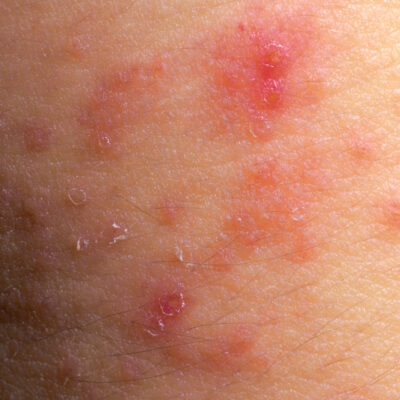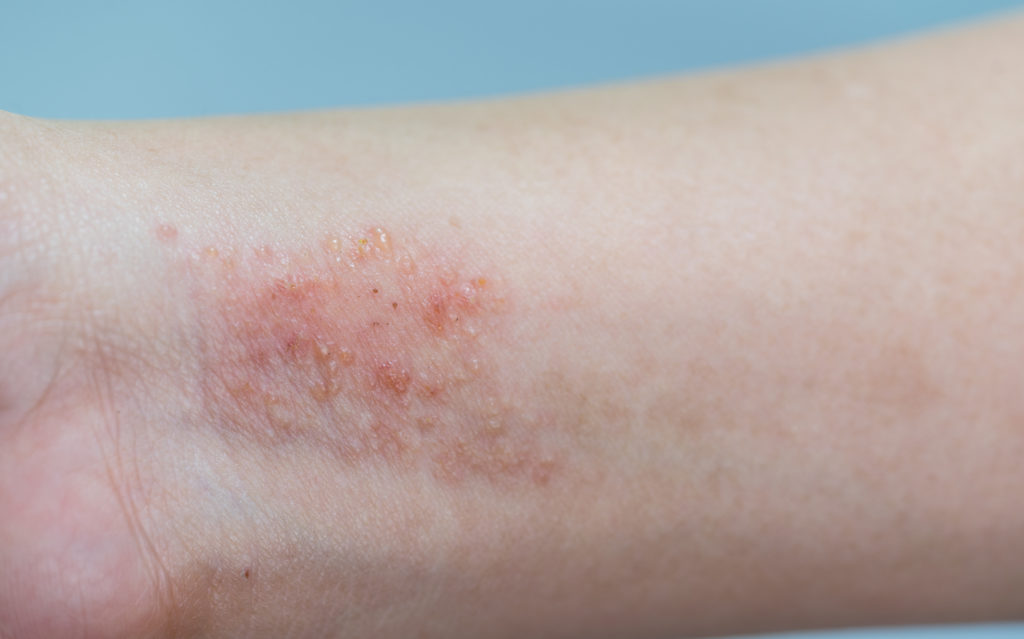Eczema is an incredibly common skin condition that causes your skin to get itchy, dry, and bumpy. It weakens the functionality of your skin barrier, which is an essential part of keeping your body protected from the elements. For some people, eczema is more of a nuisance than anything else, but for others, it can seriously impact their life.
If you struggle with eczema, a dermatologist can help you understand what causes eczema in your case and what can be done to alleviate your symptoms.
Here’s what you need to know about what causes eczema, the different types of eczema, common eczema triggers, and what you should do if you suffer from this skin condition.

What Causes Eczema?
What causes eczema is not yet entirely understood. That said, there are several factors that have been linked to eczema as probable causes.
Some factors that can cause eczema include:
- Genetics. If there’s a history of eczema in your family, you’re more likely to have it too. This is especially true if your family has a history of allergies, hay fever, or asthma.
- Immune system. If you have an overactive immune system, external irritants can cause eczema flares.
- Defects in the skin barrier. This can cause your skin to let moisture out and bacteria in, which can cause eczema.
- Environmental factors. Many environmental factors can cause eczema, from harsh fabrics to low humidity to pollutants in the air and more.
What Doesn’t Cause Eczema?
Some skin conditions, like warts, are contagious. This can lead people to worry that if someone they know has eczema, they will get it too. However, eczema isn’t contagious.
Some people also assume that eczema is an autoimmune disease. It is not classified as such, and research is still underway to better understand the connection between eczema and your immune system.
The Different Types Of Eczema

If you’re wondering what causes eczema, it’s important to note that there are multiple different types of eczema. Potential causes and triggers can vary depending on the type of eczema that you’re suffering from.
- Atopic dermatitis is what most people think of when they think of eczema. It’s the most common type, manifesting itself as itchy, dry skin with a rash.
- Contact dermatitis is when your eczema is a reaction to something that you touched, like chemicals or latex.
- Dyshidrotic eczema causes little blisters to form on your hands and feet. It’s more common in women than in men.
- Hand eczema only affects your hands. You’re more likely to experience this type of eczema if your job exposes your hands to chemicals regularly.
- Neurodermatitis is like atopic dermatitis, with thick, scaly patches. It usually occurs in people with other types of eczema or psoriasis.
- Nummular eczema is when you have coin-shaped spots on your skin. It can be incredibly itchy and can result from insect bites or allergic reactions.
- Seborrheic dermatitis is when you have oily, scaly patches of skin with dandruff-like flakes. This is called cradle cap when it occurs in infants.
- Status dermatitis is when your eczema has leaking fluid. It’s usually seen on your lower legs, due to poor blood circulation.
Many people can go about their daily lives just fine with eczema. However, if your eczema interferes with your life or doesn’t go away, you’ll want to see a dermatologist to obtain treatment.
What Triggers Eczema?
If you’re wondering what causes eczema, it can be helpful to keep a skin diary noting your diet, the types of activities you do, your skincare routine, and when you’re under mental duress. This can help you to notice patterns and potential triggers for your eczema flare-ups.

Some common triggers for eczema include:
- Skin irritants
- Allergies
- Infections
- Prolonged exposure to water
- Being too hot or too cold
- A low humidity, dry environment
- Not moisturizing your skin
- High stress levels
- And many, many more
Can Eczema Go Away?
Eczema is very common in early childhood. If you have eczema as an infant, it may go away. However, if it persists into adulthood, it may be an ongoing struggle for you. Eczema can appear at any age. Depending on the type of eczema you have and what triggers it, you may have more eczema flare-ups or less.
If you’re struggling with eczema, it’s important to make an appointment to see a dermatologist. They will go over what causes eczema and various types of treatments in order to come up with a specific treatment plan for you.
Allen-Taintor Dermatology provides eczema treatment. Contact us today to schedule an appointment and let us help you get your eczema under control!
